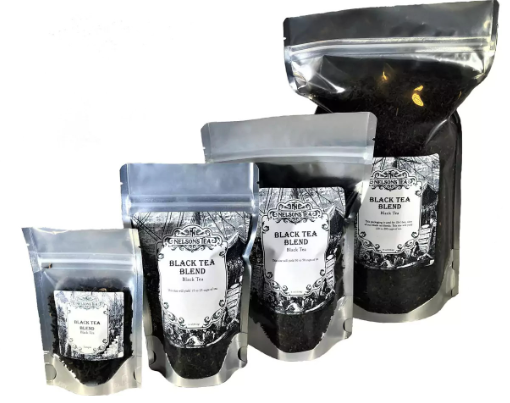
Black tea has captivated tea drinkers for centuries with its rich flavor and aroma. The history of how a leaf from the Camellia sinensis plant made its way into a steaming hot tea cup is fascinating, and the story behind black tea's creation is no less captivating.
The tea world's leader, China, stumbled upon a revolutionary discovery in the 17th century. Sun-drenched tea leaves, accidentally left out, underwent oxidation, creating a unique type of tea. A resourceful farmer salvaged them, drying them over a fire — and Lapsang Souchong, the first black tea, was born.
Black tea's longer shelf life sent traders into a frenzy, and the British eventually found a heartier plant in India. They helped to pave the way for iconic black teas like Earl Grey and Darjeeling. Once an aristocratic drink, black tea now reigns supreme as a global favorite.
Each cup offers a symphony of taste, from the robust to the delicate. But black tea's allure goes beyond the palate. It actually can help you be healthier. Let's uncover several health benefits of loose-leaf black tea together.

What is Black Tea?
Have you ever wondered what makes black tea so special? It all starts with a simple leaf on the Camellia sinensis plant. Unlike green tea, which undergoes minimal processing, black tea leaves are fully oxidized. Being “oxidized” means a chemical reaction occurs when the leaves are exposed to air after they've been picked. This oxidation process gives black tea its characteristic dark color, bolder flavor, and longer shelf life.
Finally, the leaves are sorted and packaged, ready to be enjoyed as a delicious cup of loose-leaf black tea.
What Makes Black Tea Unique?
Aside from water, black tea is one of the most popular drink options worldwide. It’s loved for its robust taste profile, from malty to slightly sweet. As discussed above, the oxidation is what makes black tea stand out.
This process also increases the amount of caffeine in black tea. While it offers a stimulating pick-me-up, black tea has less caffeine than coffee. Black tea's most distinctive quality is its potential for your health, which we'll explore in detail next.

Health Benefits of Black Tea Consumption
Black tea’s benefits for your health are pretty unique. It’s packed with antioxidants called polyphenols and offers protection from chronic diseases. Black tea extract also contains specific antioxidants not found in other loose-leaf teas.
Black tea has higher levels of theaflavins and thearubigins compared to loose-leaf green tea. These complex antioxidants are formed during processing. They may contribute to the potential benefits of black tea for gut health and anti-inflammatory properties, which we’ll discuss shortly.
Even loose-leaf herbal teas containing some black tea have perks and are definitely healthier than sugary milky alternatives. Opt for loose tea leaves over tea bags if you want the full benefits, which include the following health advantages.
Boosts Heart Health
Black tea is a champion for heart health. Studies suggest regularly drinking black tea can help high blood pressure, a significant risk factor for heart disease. Black tea's magic lies in its flavonoid content.
Flavonoids are natural compounds found in plants that act as antioxidants. They help cardiovascular health by combating inflammation and improving blood vessel function. These are similar to those found in red wine, dark chocolate, and nuts and could reduce the risk factors of heart disease by 8%.
Improves Focus
Do you find yourself needing help to concentrate throughout the day? A cup of black tea might be the answer. Black tea contains caffeine, which is well-known for enhancing alertness and focus.
Don't worry about too much caffeine or jitters! Black tea has an amino acid called L-theanine, which works alongside caffeine to promote mental clarity and reduce anxiety. Think of L-theanine as caffeine's calming friend, helping you focus without feeling jittery.
Lowers Blood Sugar Levels
Black tea may be a valuable tool in managing blood sugar levels. Drinking black tea without added sweeteners can decrease blood glucose. A joint study with China and Australia showed this to be a great benefit.
People who drank black tea daily had a 53% lower risk for prediabetes and a 47% reduced risk for type 2 diabetes. Drinking tea benefits people who need extra help keeping their blood sugar levels in check.
Help Reduce the Risk of Stroke
Anybody worried about heart disease will be glad that black tea consumption may positively impact strokes. Studies suggest that “regular black tea drinkers have a lower risk of stroke compared to non-tea drinkers.” This particular study suggested that 3 cups daily of black tea could prevent a stroke.
Help Reduce the Risk of Cancer
The National Cancer Institute acknowledges that black tea may play a role in cancer prevention. While more research is needed, some studies suggest that black tea's antioxidants might help fight free radicals.
Free radicals are like tiny villains in your body, constantly causing damage by bouncing around and bumping into healthy cells. This damage, especially to a cell's DNA, can contribute to the development of chronic diseases like cancer. Antioxidants can help fight them off.
Consuming black tea daily can reduce the risk of certain cancers by neutralizing free radicals already in your body.
Improves Gut Health
Studies suggest that certain gut bacteria are vital for good gut health. Black tea helps your digestive system grow strong, good bacteria. Its ingredients, like polyphenols, favor good bacteria while keeping bad ones in check. All this adds up to a healthier digestive system.
How Much Black Tea is Too Much?
While black tea offers a bounty of benefits, moderation is key. You can safely consume 4-5 cups of black tea daily, and even a few more if they're small cups. But it's important to consider your individual sensitivity to theine, a stimulant similar to caffeine found in black tea.
Adjusting your black tea intake can be beneficial for a few reasons. If you find yourself struggling to sleep after enjoying a cup, you might be more sensitive to theine, black tea's form of caffeine. In this case, limiting your intake or switching to decaf in the afternoons and evenings can make a big difference.
It's also important to listen to your body's overall response. If black tea makes you feel jittery or anxious, consider reducing your consumption to a more comfortable level. The best way to determine your ideal black tea intake is to find your personal sweet spot!
Pro Tip: Black tea can offer a gentle energy boost in the morning. Consider switching to green or white tea later in the day, as they may have a lower theine content.
What is the Difference Between Black Tea and Green Tea?
Green tea or black tea? This age-old question has tea enthusiasts divided. Both come from the same plant, Camellia sinensis, but their processing methods are different.
Black Tea: The Bold and Robust
Black tea undergoes complete oxidation. This process is where the leaves are exposed to air. It then triggers a chemical reaction that darkens the leaves and intensifies the flavor. Oxidation results in:
- Color: Deep amber or reddish-brown
- Flavor: Rich and complex, ranging from malty to floral notes
- Caffeine Content: Generally higher than green tea (40-70mg per cup)
- Potential Health Benefits: It may promote gut health, offer some anti-inflammatory properties, and boost moderate caffeine.
Now, let's see how green tea's processing method creates a unique taste and profile compared to its bold black tea counterpart.
Green Tea: The Light and Grassy
Unlike black tea, green tea undergoes minimal oxidation, preserving its natural compounds. This approach to processing creates an enjoyable tea-drinking experience, one that is both delicate and delightful, resulting in:
- Color: Light to medium green
- Flavor: Grassy with possible nutty or savory notes
- Caffeine Content: Lower than black tea (20-45mg per cup)
- Potential Health Benefits: Known for its antioxidant content, potentially aiding heart health and offering a milder caffeine boost.
Enjoy both green and black tea in moderation, ideally 2-4 cups per day. Looking for a more in-depth view of the differences? Check out Green Tea vs. Black Tea: Which One is Healthier?
Which is Healthier, White Tea or Black Tea?
White tea is another tea derived from the Camellia sinensis plant. It undergoes minimal processing, making it the least oxidized of the three. It has a delicate flavor and the highest concentration of antioxidants.
Yet, both black and white tea offer distinct benefits. Which is the "healthier" option depends on your specific needs. Black tea might be a good choice if you're looking for a more robust flavor and a heart health boost. White tea, loose-leaf, of course, might be ideal if you prefer a delicate taste and want the most antioxidants.
Conclusion:
Black tea is more than a delicious beverage; it's a natural source of health benefits. From promoting heart health to improving focus and gut health, there are many health-related reasons to drink black tea daily.
Explore the world of black tea with Nelson's Tea, where you can discover premium teas, tea samples, and tea accessories to enhance your tea-drinking experience. Steep a cup of black tea, savor its rich flavor, and embrace its many health benefits!
Whether you're looking for a morning pick-me-up or a relaxing evening drink, black tea can be a delightful and healthy addition to your day. With its vast selection of flavors and potential health benefits, a perfect cup of black tea is waiting for you to discover.
Now, go forth and enjoy the wonderful world of black tea!
These statements have not been evaluated by the Food and Drug Administration. This product is not intended to diagnose, treat, cure, or prevent any disease.

